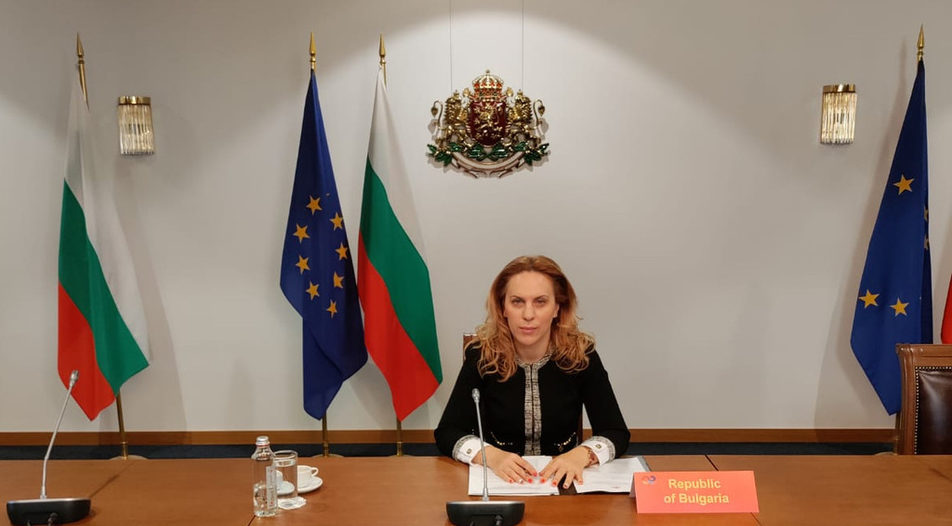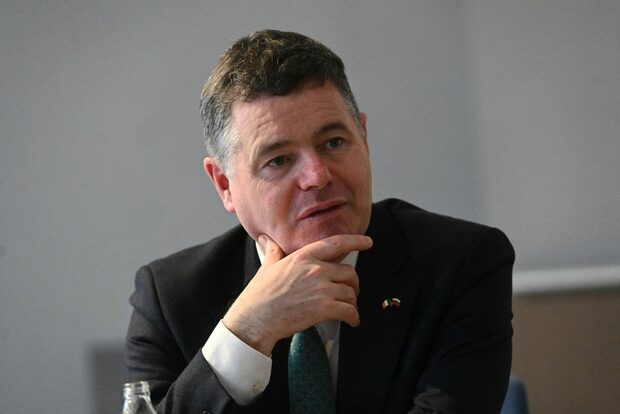Meet Mariana Nikolova.
She epitomizes everything you need to know about Bulgarian politics today.
On paper, Nikolova is a fabulous success story - rags to riches, Disney style. Once an employee of a Sofia heating company, she managed to rise to prominence as chief of staff to Valeri Simeonov: the leader of a small nationalist party that ended up in the ruling coalition 4 years ago.
Simeonov became deputy prime minister but his tongue and racist remarks quickly undid him. When he left, Nikolova was suddenly promoted: she became deputy to Boyko Borissov, the most powerful man in the country. It was seen at the time as a way for Simeonov to keep his toehold in the government.
Borissov saw the usefulness of that arrangement and over the last 3 years turned Nikolova into a placeholder for everything the government pretends to care about. Currently, 45-years old Nikolova (a lawyer by training) is in charge of economic and demographic politics, cybersecurity, e-government, tourism, and this week was voted as the head of the coordination unit for the upcoming elections.
So, in theory, Nikolova is the second most important person in the country. And in practice, she is the avatar Borissov sends somewhere when he doesn't want negatives connected to him or his party. It is telling that a lot of people don't even recognize Nikolova by name, or her role as a deputy prime minister.
So how do you tell if the government doesn't really care about something and just prefers to keep its hands clean? Right, look for where Nikolova has been sent.
Over the last two weeks, she has had two major assignments.
Let's take a closer look.
POLITICS THIS WEEK
Hello Xi, it's me
First stop for the deputy prime minister was the 17+1 summit with China. Once upon a time, Sofia was in love with the money Beijing promised. Yet, fast forward several years and - as the Bulgarian proverb has it - "wide eyes, empty hands". None of the major investments the government hoped for materialized, and in the meantime, the two capitals Borissov listens most to: Brussels and DC, turned their backs to China.
Bulgaria now plans to diminish the use of Huawei technology in its telecom sector and doesn't really believe promises anymore.
So this time around, when Xi Jinping called, Nikolova was sent to answer the phone.
Not welcome anymore
As this article in Politico explains, Sofia was far from alone in giving Beijing the cold shoulder. Eastern Europe, it seems, is about to throw out another colonizing power. To add insult to injury, Nikolova stated to Xi that Bulgaria expects China to open its markets more to Bulgarian and European produce, and especially food since there is an agro-center built in Plovdiv as part of 17+1 initiative.
Can you look over this election for me, please?
Mariana Nikolova was also entrusted with organizing the elections. Now, a few clarifications: the government is supposed to ensure the logistics surrounding the electoral process, which in itself is controlled by the Central Electoral Committee. In the current political climate, tainted by suspicion about the ruling GERB party and potential manipulations of the vote, Nikolova is very useful to Borissov. Nominally, he can distance himself from her while, of course, keeping control over the whole process.
In case anyone comes out to vote, of course
It is a done deal (as much as anything is these days) - restaurants and bars are opening on 1 March. By scrapping the remaining lockdown measures one month before the elections, Borissov is playing with fire: a huge rise in cases might restrain voters from coming out. That, however, will still play in his favor - read more here.
Speaking of which, vaccinations are still slow
Yet the order for getting them has broken down completely. Mass vaccinations were supposed to start in March, but everyone who can get their hands on a vaccine is trying to jump the queue, and vulnerable groups be damned. The latest to try are IT companies who made it to national priority lists before people over 65.
Full disclosure: journalists were earlier also allowed to jump the queue because they were deemed a vital group with elections pending.
ECONOMY
There are (at least) 3 ways to look at the Bulgarian economy right now.
The first one is the financial markets. On that front, it's 'steady and promising'. This week the Bulgarian government sold 10.5 years bonds for 153 mln. euro by easily getting excellent conditions and a yield of 0.1%. With its low debt and solid fiscal policy, Borissov's government plans to issue more debt next week, reaching 250 mln. euro and paying off some maturing bonds in February.
The conditions are very favorable, the market is full of liquidity and the government can easily keep the balance between a good fiscal buffer, a maturing debt obligation and a newfound deficit last year.
Looking good on paper
The second way to look at the economy is the statistical one. This week the National Statistical Institute revealed some data about 2020: GDP shrank by 3.5%. This is bad, of course, but far better than the eurozone numbers, and exports were actually reviving in the last quarter with 2.1% growth compared to the previous quarter.
Average salaries are also soaring - by 9.1% in the private sector and by a whopping 13.8% in the public one, primarily because of the coronavirus measures. They currently stand at 831 euro for the public sector and 723 for the private.
This explains why revenues in the budget are also higher than projected, although consumption took a severe hit: 5.7% on an annual basis and 7.7% on a quarterly basis for the last three months of 2020. (There is one sector where consumption kept growing - e-commerce now tops a billion euro in revenues).
And yet, there is the third way: the real world
This week The Economist and the government organized an event to present the new Recovery and Resilience plan of 6 bln. euro that Bulgaria is going to use for the next 3-4 years (presented in our newsletter a week ago). Amongst the already traditional self-congratulatory notes of ministers, some criticisms and suggestions for improvement from commentators and experts were notable.
"Last-mile connections of Bulgarian ports on the Black Sea to railways and introducing high speed and high capacity trains will boost trade from east to west and put BG at the hub of western Balkans trade connections," said one.
"Efficiency of public spending and dealing with corruption," pointed out one of the experts when asked what holds Bulgaria back.
Those are all fair points. Yet this government is at the point where it refuses to accept anything that smells like criticism.
This is what 12 years in power do to you, I guess. So while Bulgaria is the greatest net beneficiary of the new EU fund (in GDP terms), it would be wildly optimistic to assume that this money will be the sole prerequisite for a brighter future.
Case in point: the trains
Abandoned, parceled, sold out and outmaneuvered by the bus and road lobby, they have been in disrepair for 3 decades now. Bulgaria has been promising the EC to build a fast-rail connection between the Black Sea, the Turkish border and the Serbian border for 14 years now. It is still under construction and it doesn't look as though it will be ready before 2027. There is not even a fast rail connection between the two biggest cities - Sofia and Plovdiv and it is a mere 150 km. A whole world of opportunities have been lost.
BUSINESS
Automotive
OdeloThe auto headlights company plans to open a new factory near Plovdiv by 2023. Construction has already started and the Turkish parent company plans to invest 10 mln. euro in it. The first factory opened a year ago in the same location. Another 100 workers will be employed there.
Arms
TeremThe state-owned company for repairs and modernization or armament will be tasked with contracting 150 new armored vehicles for the Bulgarian army, announced Defence Minister Krassimir Karakachanov. This means that Terem will be free to circumvent strict requirements surrounding the existing procurement and contract with the companies it decides to pick as subcontractors. This happened after the procurement fell through with General Dynamics European Land Systems (GDELS), and the Finnish Patria bidding much higher offers than the projected 700 million euros.
StartUps
BoleronThis Bulgarian e-insurance broker just secured a 500 thousand euro investment from two venture funds. NV3 and Eleven are entering the company with 300 and 200 thousand euros respectively. Bolero has operated since 2019 and offers an online platform for all types of insurances. It will use the money to enter new markets.
Electric
OsramThe new owner of the Bulgarian factory of "Osram" - the American company Sanmina, will raise the production capacity, announced Capital Weekly. It will probably mean 3 shifts and in the future - new clients except Osram. The deal for the factory was announced recently and there is not yet a confirmed price. The driver and electrical parts factory opened in 2017 and the investment was 25 mln euro. "Osram" revenues in Bulgaria in 2019 - the last available year - were a little less than 70 mln euro and the company employs 830 people
ENERGY
Nuclear? Not clear.
Bulgaria has a decades-old problem - it is a member of the elite nuclear energy club but hasn't decided how to continue this membership: through a new NPP or adding more reactors to an already existing one. So why is it so hard to choose? Martin Dimitrov explains.
How long does a pipeline take?
TurkStream pipeline runs through the whole of Bulgaria and took around a year to build. Bulgaria paid for it with its own money borrowed from the Russians and gave it to Gazprom. The solution for diversification is a connection to Greece. It has been in the making for a decade now.
Work on the interconnector started almost a year before TurkStream and its length is about a third. Nonetheless, it will not be ready by October 2021. The news came during Prime Minister Boyko Borissov's visit to the construction site on Thursday as the Greek Avax company engaged in building the pipeline sought an extended deadline for completion from April to the end of September.
WATCH OUT FOR
People
Vasil BozhkovThe ex-gambling mogul and underground figure wants to participate in the upcoming elections, yet his party didn't register for it. Now he wants to join another formation, while safely staying in Dubai
Dates
22 FebruaryBulgaria issues yet more debt - 100 mln.euro in 5-year bonds.
Next week
Probably will be given the start to the mass vaccination campaign
WORDS OF THE WEEK
Shahta
The Bulgarian word for shaft. The word dominated the news all week because of the tragic incident of a 16-year-old boy killed by electricity when stepping on a metallic shaft cover. Turns out, an illegal cable was powering a half-legal caravan selling nuts in front of a national hospital, in the middle of the biggest city. And no one knew why, as the follow-up briefing of the 4-th time mayor of Sofia Yordanka Fandakova made clear. Also, no one from the mayor's office resigned.
Meet Mariana Nikolova.
She epitomizes everything you need to know about Bulgarian politics today.












